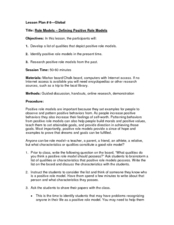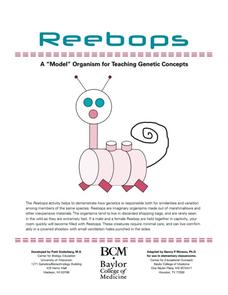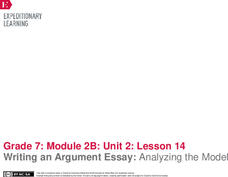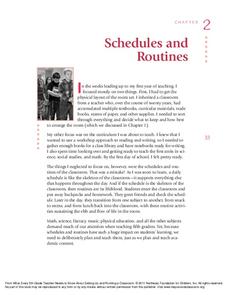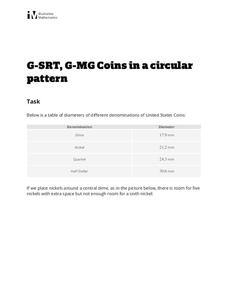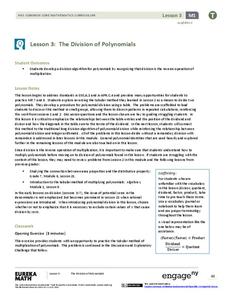Curated OER
Role Models - Defining Positive Role Models
Being able to identify what characteristics make a good role model is one way for students to better understand their own positive behaviors. The class brainstorms what characteristics make up a good role model, research a role model...
Science Matters
Volcano Models
More than 80 percent of the earth's surface originated from volcanoes. The 16th instructional activity in a 20-part series introduces the shape and development of volcanoes. It begins with a demonstration using a balloon and flour...
Curated OER
Initial Fraction Ideas Lesson 10: Overview
Third graders use strips of paper to find equivalent fractions. They will fold paper into thirds and shade 2/3 of the paper. Then fold the same paper in six parts and predict how many parts will be shaded. They will repeat again folding...
EngageNY
Developing Reading Fluency: Beginning the End of Unit 2 Assessment
Third graders continue to develop their reading fluency in preparation for their assessment in the tenth lesson plan of this unit. Young readers are provided with a short passage on Helen Keller, which they use while working in pairs...
Baylor College
Reebops: A “Model” Organism for Teaching Genetic Concepts
In a sweet simulation, junior geneticists examine the chromosomes of a fictitious Reebop marshmallow animal, combine chromosomes to produce offspring, and then make a model of the resulting Reebop baby. Phenotypes include number of...
EngageNY
Developing Reading Fluency: Criteria for Reading Aloud
Third graders develop their reading superpowers in a lesson plan on fluency. After first listening to an audio recording or teacher read aloud, the class works together identifying criteria for fluent reading, focusing on phrasing, rate,...
EngageNY
Modeling Riverbeds with Polynomials (part 2)
Examine the power of technology while modeling with polynomial functions. Using the website wolfram alpha, learners develop a polynomial function to model the shape of a riverbed. Ultimately, they determine the flow rate through the river.
Curated OER
Changing It Up
How should a cashier stock a cash register with coins? Learners use mathematical modeling and expected value to determine how many rolls of coins of each type they should place in a cash register.
EngageNY
Scaffolding for Essay: Examining a Model and Introducing the NYS Grade 6–8 Expository Writing Evaluation Rubric
Write it down. Scholars take a close look at essay writing by examining the New York state writing rubric. They then discuss a model essay and compare the model essay to the What Makes a Literary Analysis Essay Effective? Anchor...
EngageNY
Writing an Analysis Essay: Introducing the Writing Prompt and the Model Essay
A model analysis essay provides writers with an opportunity to examine a response to the end-of-unit assessment writing prompt. Scholars define key words in the prompt and discuss how the model essay meets the demands in the prompt....
EngageNY
Writing an Argument Essay: Analyzing the Model
Class members analyze the model essay to determine the given claim and the evidence to support it. They use an Analyzing Evidence in the Model Essay sheet to help guide their work. They then begin to analyze the structure of the essay by...
Northeast Foundation for Children, Inc.
Schedules and Routines: Grade 1
It doesn't matter if you're a new teacher trying to set up your classroom for the first time or a veteran teacher looking for new ideas to freshen up your teaching, this resource has something to offer everyone. After...
Northeast Foundation for Children, Inc.
Schedules and Routines: Grade 5
Before diving head first into the year's curriculum, take time to establish clear routines and procedures for your classroom. Starting with how to set up a class schedule that meets the needs of fifth grade learners, this sample...
Illustrative Mathematics
Coins in a Circular Pattern
What starts as a basic question of division and remainders quickly turns abstract in this question of related ratios and radii. The class works to surround a central coin with coins of the same and different values, then develops a...
EngageNY
The Division of Polynomials
Build a true understanding of division of polynomials. Learners use their knowledge of multiplying polynomials to create an algorithm to divide polynomials. The area model of multiplication becomes the reverse tabular method of division.
EngageNY
Exponential Decay
I just bought that car, how can its value decrease already? Individuals use the data of a depreciating car value to create an exponential decay model. They then compare exponential decay and growth equations.
Curated OER
Express Yourself Lesson Seed 12: Story Event
Focus on plot and the impact-specific events in The Cay. Class members use their double-entry journals, created in a previous lesson in this series, to record their thinking about the guiding question as they read chapters 15 through 17....
Curated OER
Math Manipulative and Math Teacher Tool Labels
Bring some organization to your class's supply of math manipulatives with this collection of printable labels. From rulers and base-ten blocks, to stopwatches and fraction circles, labels are included for dozens of different objects,...
Curated OER
Role Models
First graders identify heroes by researching their family history. For this personal heritage lesson, 1st graders define the term "hero" and the characteristics that represent it. Students research family resources and family trees in...
National Nanotechnology Infrastructure Network
Introduction to Nanotechnology Using the Creative Problem-Solving Model
Should we continue to spend money on nanotechnology? Groups engage in a problem-solving unique process around the newly emerging research field of nanotechnology. In order to propose a solution, the groups must research nanotechnology...
Rational Number Project
Rational Number Project: Initial Fraction Ideas
Deepen the fractional number sense of young learners with this introductory lesson on equivalent fractions. After completing a short warm-up activity, children go on to work in pairs using fraction circles to complete a table of...
EngageNY
Modeling with Quadratic Functions (part 2)
How many points are needed to define a unique parabola? Individuals work with data to answer this question. Ultimately, they determine the quadratic model when given three points. The concept is applied to data from a dropped...
Curated OER
Teaching About Plate Tectonics and Faulting Using Foam Models
Young scientists learn about plate tectonics and the three different types of faults (normal, reverse, and strike-slip) using foam models. The activity also covers common types of locations where these faults are found.
Education Bureau of Hong Kong
Mental Models
Critical to responsible decision making is becoming aware pre-conceived notions and biases that influence our perceptions. A colorful slide presentations asks viewers to consider these mental models that factor into their assumptions and...
